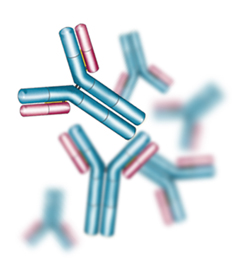Immunoglobulins: Part of your cellular army
Immunoglobulins, otherwise known as antibodies are large proteins, that come in a wide range different types; but they all come with a similar structural framework. Antibodies bind to a target with discriminate specificity - causing irreversible damage to the target antigen (foreign object within the body, ranging from viruses, bacteria or a type of molecule).
 The body's immune response is highly adaptive and is able to detect a foreign substance, and so defends itself via an (adaptive) immune response. This response comes in two forms: the humoral and cellular immune responses.
The body's immune response is highly adaptive and is able to detect a foreign substance, and so defends itself via an (adaptive) immune response. This response comes in two forms: the humoral and cellular immune responses.
Humoral responses involve lymphatic cells called B lymphocytes that produce cells that act as a foreign substance tagging system - they bind to the target antigen, causing the foreign substance to group together, and thus letting the body know that it needs to be destroyed. The cells that detect and destroy antigens that are tagged are called macrophages. T lymphocytes involved in the cellular immune response locate and destroy foreign cells.
Provided the antigen is large enough (like a virus, bacterial cell or a protein), more than one type of antibody may be produced, since substances that are large generally have different components that require different antibodies to bind to, and destroy the foreign object.
The body's immune response is highly adaptive, but it's even capable of having a sort-of "memory" system. For example, an initial antigen is encountered, the body produces antibodies to combat the invading substance. The next time the substance enters the body, the immune response will be even quicker and even producing more antibodies than the previous time.
Vaccines are developed with this in mind - pathogens that have been modified with a significantly reduced ability to cause disease, but still contain the antigen properties required for the body to illicit an immune response. Antibodies are produced in the body which destroy the antigen, memory cells are able to produce more antibodies if the foreign substance is encountered again.
Immature B lymphocytes are produced within the bone marrow, every cell produces one immunoglobulin molecule which are able to recognise a specific antigen because different molecules have different shapes - the antibodies have binding sites that recognise these shapes. Antibodies that do this are located on the outer membrane of B lymphocytes, these cells are constantly circulating in your bloodstream.

With the help of T helper cells, the B lymphocytes are able to produce antibodies that are soluble (mixes with the water in your bloodstream) which are able to move around the bloodstream freely. This response called is the Primary immune response and is carried out by a type of B lymphocyte called plasma cells (or, Effector B cells). The other type of B lymphocyte are memory cells, which stick around for quite a while, allowing for a rapid secondary immune response if the antigen is encountered again.
Sometimes, there is an error in immature B lymphocytes produced in bone marrow, and they accidentally bind to tissues that are part of the body - this problem is called autoimmunity, and the reasons for this are still quite unclear.
Knowing how the body manages its defense systems is vital in medicine today - it not only provides us with the means to produce more effective vaccines, but it also allows us to map out the genetic history of antibodies.

No comments:
Post a Comment